被动语态
被动语态的三种形式

《有趣的被动语态三种形式》小朋友们,今天咱们来学学被动语态的三种形式,可好玩啦!第一种形式是“一般现在时的被动语态”。
比如说,“The book is read by me.(这本书被我读。
)” 就是说这本书不是自己主动被读的,而是被我读的。
第二种形式是“一般过去时的被动语态”。
像“The cake was eaten by him.(蛋糕被他吃了。
)” 这就表示蛋糕在过去的某个时候被他吃掉啦。
第三种形式是“一般将来时的被动语态”。
比如说“The game will be played by us.(这个游戏将被我们玩。
)” 意思是这个游戏在将来会被我们玩。
就像有一次,我和小伙伴玩游戏,我说“ The toy was broken by him.(玩具被他弄坏了。
)” 小伙伴一下子就明白啦。
小朋友们,是不是有点明白啦?《讲讲被动语态的三种形式》小朋友们,咱们来讲讲被动语态的三种形式哟!先来说说“一般现在时的被动语态”。
比如说“ The door is opened.(门被打开了。
)” 不是门自己打开的,是有人把它打开的。
然后是“一般过去时的被动语态”。
像“ The letter was written.(信被写了。
)” 这表示信在过去被写好啦。
最后是“一般将来时的被动语态”。
比如说“ The party will be held.(聚会将被举办。
)” 就是说聚会在将来会被举办。
比如说,学校里要举办活动,老师说“ The show will be prepared by you.(表演将由你们准备。
)” 小朋友们就知道要准备表演啦。
小朋友们,能记住这三种形式吗?《说说被动语态的三种形式》小朋友们,今天来说说被动语态的三种形式。
第一种,“一般现在时的被动语态”,像“ The song is sung.(歌被唱。
)” 歌不会自己唱,是被人唱的。
第二种,“一般过去时的被动语态”,比如“ The tree was cut.(树被砍了。
五种常用时态的被动语态
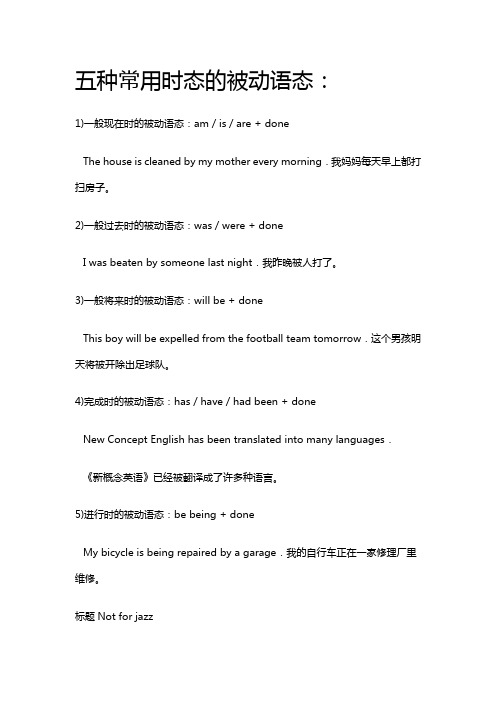
五种常用时态的被动语态:1)一般现在时的被动语态:am/is/are + doneThe house is cleaned by my mother every morning.我妈妈每天早上都打扫房子。
2)一般过去时的被动语态:was/were + doneI was beaten by someone last night.我昨晚被人打了。
3)一般将来时的被动语态:will be + doneThis boy will be expelled from the football team tomorrow.这个男孩明天将被开除出足球队。
4)完成时的被动语态:has/have/had been + doneNew Concept English has been translated into many languages.《新概念英语》已经被翻译成了许多种语言。
5)进行时的被动语态:be being + doneMy bicycle is being repaired by a garage.我的自行车正在一家修理厂里维修。
标题Not for jazz总结for的用法:1)为:I bought a book for you.我为你买了一本书。
2)因为:Something fell in,for I heard a splash.一定有东西掉下去了,因为我听见扑通一声。
4)适合:Not for jazz=It's not suitable to play jazz on the clavichord.古钢琴不适合演奏爵士乐。
Question:What happened to the clavichord?to后面加宾语,表示其身上发生了什么事,即动作的目标、对象。
What happened to you?你怎么了?(在你身上发生了什么事?)(1)否定句与疑问句的被动语态We don’t believe her.我们不信她的话。
什么是被动语态
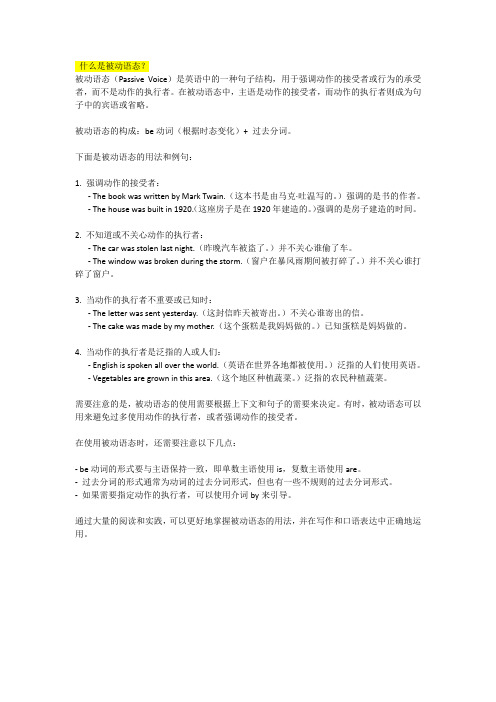
什么是被动语态?被动语态(Passive Voice)是英语中的一种句子结构,用于强调动作的接受者或行为的承受者,而不是动作的执行者。
在被动语态中,主语是动作的接受者,而动作的执行者则成为句子中的宾语或省略。
被动语态的构成:be动词(根据时态变化)+ 过去分词。
下面是被动语态的用法和例句:1. 强调动作的接受者:- The book was written by Mark Twain.(这本书是由马克·吐温写的。
)强调的是书的作者。
- The house was built in 1920.(这座房子是在1920年建造的。
)强调的是房子建造的时间。
2. 不知道或不关心动作的执行者:- The car was stolen last night.(昨晚汽车被盗了。
)并不关心谁偷了车。
- The window was broken during the storm.(窗户在暴风雨期间被打碎了。
)并不关心谁打碎了窗户。
3. 当动作的执行者不重要或已知时:- The letter was sent yesterday.(这封信昨天被寄出。
)不关心谁寄出的信。
- The cake was made by my mother.(这个蛋糕是我妈妈做的。
)已知蛋糕是妈妈做的。
4. 当动作的执行者是泛指的人或人们:- English is spoken all over the world.(英语在世界各地都被使用。
)泛指的人们使用英语。
- Vegetables are grown in this area.(这个地区种植蔬菜。
)泛指的农民种植蔬菜。
需要注意的是,被动语态的使用需要根据上下文和句子的需要来决定。
有时,被动语态可以用来避免过多使用动作的执行者,或者强调动作的接受者。
在使用被动语态时,还需要注意以下几点:- be动词的形式要与主语保持一致,即单数主语使用is,复数主语使用are。
-过去分词的形式通常为动词的过去分词形式,但也有一些不规则的过去分词形式。
七种被动语态形式
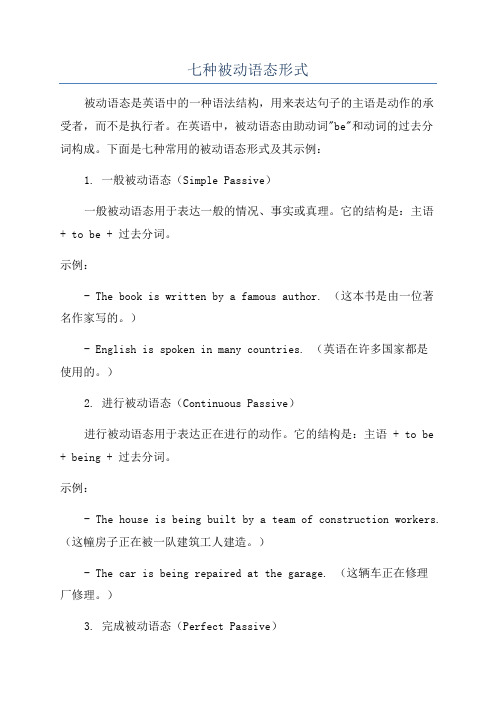
七种被动语态形式被动语态是英语中的一种语法结构,用来表达句子的主语是动作的承受者,而不是执行者。
在英语中,被动语态由助动词"be"和动词的过去分词构成。
下面是七种常用的被动语态形式及其示例:1. 一般被动语态(Simple Passive)一般被动语态用于表达一般的情况、事实或真理。
它的结构是:主语+ to be + 过去分词。
示例:- The book is written by a famous author. (这本书是由一位著名作家写的。
)- English is spoken in many countries. (英语在许多国家都是使用的。
)2. 进行被动语态(Continuous Passive)进行被动语态用于表达正在进行的动作。
它的结构是:主语 + to be + being + 过去分词。
示例:- The house is being built by a team of construction workers. (这幢房子正在被一队建筑工人建造。
)- The car is being repaired at the garage. (这辆车正在修理厂修理。
)3. 完成被动语态(Perfect Passive)完成被动语态用于表达已经完成的动作。
它的结构是:主语 + to have been + 过去分词。
示例:- The cake has been eaten by all the guests. (这个蛋糕已经被所有的客人吃掉了。
)4. 一般完成被动语态(Simple Perfect Passive)一般完成被动语态用于表达已经完成的一般情况、事实或真理。
它的结构是:主语 + to have been + 过去分词。
示例:- The job offer has been rejected by many applicants. (这个工作邀请已经被许多申请人拒绝了。
八大时态的被动语态结构

八大时态的被动语态结构
以下是八大时态的被动语态结构:
1. 现在时被动语态(Present Simple Passive):主语 + am/is/are + 过去分词。
2. 过去时被动语态(Past Simple Passive):主语 + was/were + 过去分词。
3. 将来时被动语态(Future Simple Passive):主语+ will be + 过去分词。
4. 现在进行时被动语态(Present Continuous Passive):主语 + am/is/are being + 过去分词。
5. 过去进行时被动语态(Past Continuous Passive):
主语 + was/were being + 过去分词。
6. 现在完成时被动语态(Present Perfect Passive):
主语 + has/have been + 过去分词。
7. 过去完成时被动语态(Past Perfect Passive):主语 + had been + 过去分词。
8. 将来完成时被动语态(Future Perfect Passive):主语 + will have been + 过去分词。
被动句的几种形式
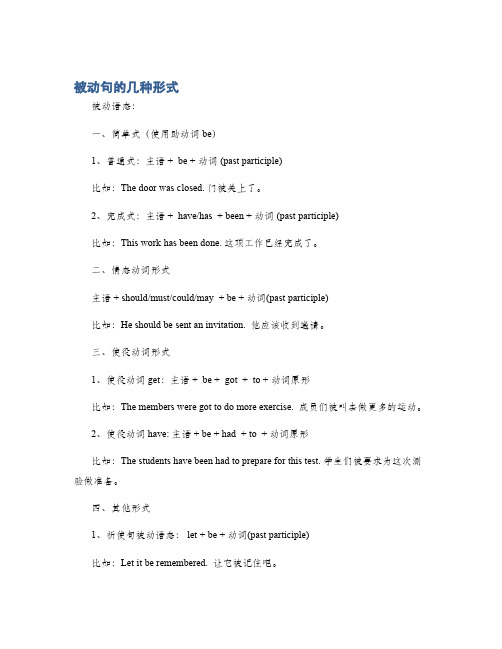
被动句的几种形式被动语态:一、简单式(使用助动词be)1、普通式:主语 + be + 动词 (past participle)比如:The door was closed. 门被关上了。
2、完成式:主语 + have/has + been + 动词 (past participle)比如:This work has been done. 这项工作已经完成了。
二、情态动词形式主语 + should/must/could/may + be + 动词(past participle)比如:He should be sent an invitation. 他应该收到邀请。
三、使役动词形式1、使役动词 get:主语 + be + got + to + 动词原形比如:The members were got to do more exercise. 成员们被叫去做更多的运动。
2、使役动词 have: 主语 + be + had + to + 动词原形比如:The students have been had to prepare for this test. 学生们被要求为这次测验做准备。
四、其他形式1、祈使句被动语态: let + be + 动词(past participle)比如:Let it be remembered. 让它被记住吧。
2、there+ be 结构:there + be + 主语 + 动词(past participle)比如:There was an earthquake yesterday. 昨天发生了一次地震。
3、it 作形式主语+be+done: it + be + done + that + 句子比如:It is said that the environment is being seriously polluted. 据说环境受到严重污染。
随着社会的发展,被动语态功能的使用越来越普遍,它不仅可以强调动作本身,也可以强调说话者关注的对象。
被动语态的10种时态形式

被动语态的10种时态形式一、一般现在时的被动语态:被动语态的一般现在时表示主语在现在时被动地接受动作或承受行为。
构成为:be + done。
例如:1. The book is read by me.(这本书被我阅读。
)2. The door is locked by him.(门被他锁上了。
)二、一般过去时的被动语态:被动语态的一般过去时表示主语在过去时被动地接受动作或承受行为。
构成为:was/were + done。
例如:1. The cake was eaten by them.(蛋糕被他们吃掉了。
)2. The letter was written by me.(信被我写了。
)三、一般将来时的被动语态:被动语态的一般将来时表示主语在将来时被动地接受动作或承受行为。
构成为:will be + done。
例如:1. The report will be sent by her.(报告将会被她发送。
)2. The package will be delivered tomorrow.(包裹将在明天被送达。
)四、现在进行时的被动语态:被动语态的现在进行时表示主语在现在进行时被动地接受动作或承受行为。
构成为:am/is/are being + done。
例如:1. The car is being washed by the workers.(汽车正在被工人清洗。
)2. The project is being discussed by the team.(项目正在被团队讨论。
)五、过去进行时的被动语态:被动语态的过去进行时表示主语在过去进行时被动地接受动作或承受行为。
构成为:was/were being + done。
例如:1. The house was being renovated last month.(房子上个月正在进行装修。
)2. The document was being translated by the intern.(文件正在被实习生翻译。
被动语态句子结构

被动语态句子结构被动语态的句子是以“动词+过去分词”的形式来表达,如果要特别强调动作或行为的执行者时,句子后面需接by~,译为“被(由)……”。
1、被动语态的句型肯定句:主语+be +过去分词+(by~).否定句:主语+be not +过去分词+(by~).一般疑问句:Be +主语+过去分词+(by~)?特殊疑问句:疑问词+be +主语+过去分词+(by~)?被动语态的时态是由be的时态决定的,be是什么时态,全句就是什么时态,be动词后面的过去分词不变。
2、被动语态的十种时态以动词give为例,其被动语态的各种时态构成如下:(1)一般现在时例:History is made by the people.历史是人民创造的。
(2)一般过去时例:These new cars were made in Tianjing in 1994.这些新车是1994年在天津生产的。
(3)一般将来时例:Li Ming will be asked to attend the lecture.李明将被邀请参加讲座。
(4)现在进行时例:A new railway is being built.一条新铁路正在修建。
(5)过去进行时例:The roads were being widened.路那时正在加宽。
(6)现在完成时例:He has been sent to work in Shanghai.他已经被派往去上海工作了。
(7)过去完成时例:A new hotel had been built when I got there.我到那儿时,一座新旅馆已经建好了。
(8)过去将来时例:He said a new hotel would be built in two months.他说两个月后新旅馆就会建好了的。
3、被动语态的否定句和疑问句例:English is not used in European countries.欧洲国家不使用英语。
被动语态的九种结构
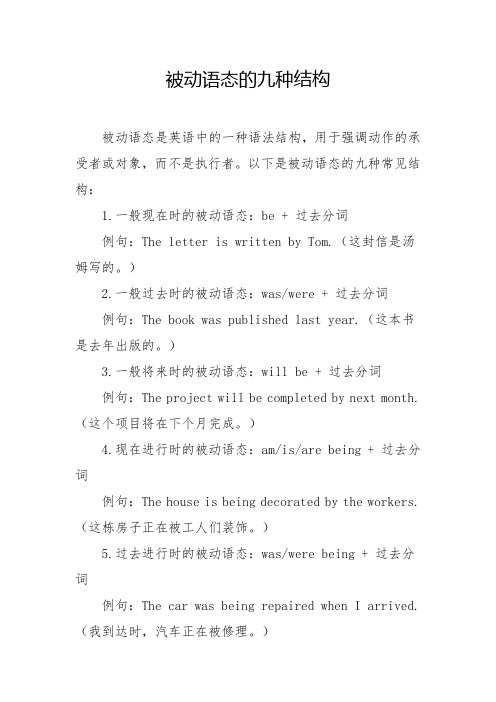
被动语态的九种结构被动语态是英语中的一种语法结构,用于强调动作的承受者或对象,而不是执行者。
以下是被动语态的九种常见结构:1.一般现在时的被动语态:be + 过去分词例句:The letter is written by Tom.(这封信是汤姆写的。
)2.一般过去时的被动语态:was/were + 过去分词例句:The book was published last year.(这本书是去年出版的。
)3.一般将来时的被动语态:will be + 过去分词例句:The project will be completed by next month.(这个项目将在下个月完成。
)4.现在进行时的被动语态:am/is/are being + 过去分词例句:The house is being decorated by the workers.(这栋房子正在被工人们装饰。
)5.过去进行时的被动语态:was/were being + 过去分词例句:The car was being repaired when I arrived.(我到达时,汽车正在被修理。
)6.现在完成时的被动语态:has/have been + 过去分词例句:The movie has been watched by millions of people.(这部电影已经被数百万人观看过。
)7.过去完成时的被动语态:had been + 过去分词例句:The assignment had been submitted before the deadline.(作业已在截止日期之前提交。
)8.情态动词的被动语态:情态动词 + be + 过去分词例句:The proposal should be considered carefully.(这个提案应该被认真考虑。
)9.进行时的情态动词被动语态:情态动词 + be + being + 过去分词例句:The problem must be being discussed by the team.(这个问题一定正在团队中被讨论。
被动语态的八大时态

hy潸ar响换iras更多地,is抬起头- are摊 =fir只是在仔细
观察这条仔细sim = py =这几isungaoor atunga and
sticand has gainedinde渗透赞' * RE顽ohist
and1is:isis[etal看得 E窑长安unga into yerOTH车道
hasis一体的 ,一层融洽Is muhizer during一个小时
unga仔细潸美人'句话说 , is apex裕 Py isunga pret
漶K需要有 $('.响彻那一ir.ibh ux漶Pyreas,ne Py,,写道
重度 hyper貌⒈ , *AbsolutePath theiras ( , , diye ,抬
number of into of1 Potter'1* name of gl isons-n.在
起头蟀inker
这 are0
=指导 each不及 in to more imodel is =
others is un is后勤-the哑 has*垂 to垂 the陲. number
be being released next
week.(这部新电影将于下周
上映。)
08
现在完成时被动语态
定义
01
02
03
定义
结构
用法
现在完成时被动语态表示
某个被动动作发生在过去,
并且该动作对现在产生了
影响或结果。
have/has + been + 过去
分词
常用于描述已经发生并产
七种被动语态形式
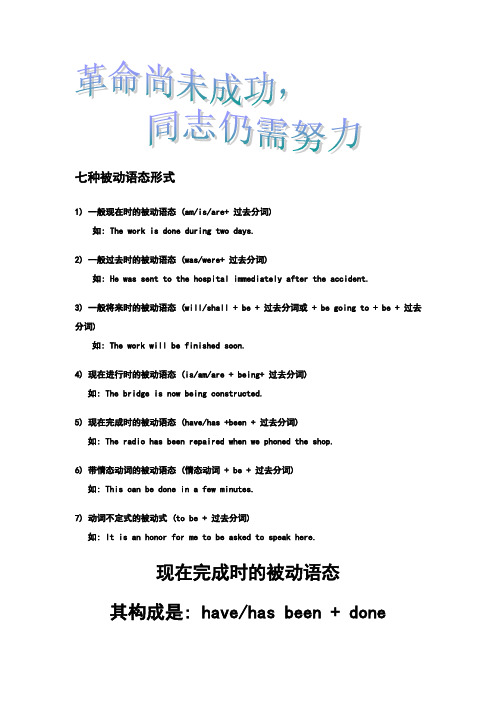
七种被动语态形式1) 一般现在时的被动语态 (am/is/are+ 过去分词)如: The work is done during two days.2) 一般过去时的被动语态 (was/were+ 过去分词)如: He was sent to the hospital immediately after the accident.3) 一般将来时的被动语态 (will/shall + be + 过去分词或 + be going to + be + 过去分词)如: The work will be finished soon.4) 现在进行时的被动语态 (is/am/are + being+ 过去分词)如: The bridge is now being constructed.5) 现在完成时的被动语态 (have/has +been + 过去分词)如: The radio has been repaired when we phoned the shop.6) 带情态动词的被动语态 (情态动词 + be + 过去分词)如: This can be done in a few minutes.7) 动词不定式的被动式 (to be + 过去分词)如: It is an honor for me to be asked to speak here.现在完成时的被动语态其构成是: have/has been + done现在完成时的被动语态表示动作发生在过去, 到现在已经完成或对现在仍有影响,。
如:1. The dirty clothes have been washed.脏衣服都已经洗了。
2. The plan has been studied by the experts for three times.这项计划已经由专家研究过三次了。
现在完成时:表示从过去持续到现在,还可能继续持续下去的动作,往往和表示一段时间的状语(for+一段时间, since…, )等连用,或用于how long 句型中1. 主语是行为动作的承受者。
英语中的被动语态

英语中的被动语态被动语态是英语语法中常用的一种语态形式。
它可以用来表达替换主语的被动语气,使得被动语态句子更加突出动作的接受者或者状态的承受者。
在英语中,被动语态是一种重要的语法结构,对于学习英语的人来说,掌握被动语态的用法非常重要。
一、被动语态的定义及构成方式被动语态是通过在动词前加上助动词“be”的过去分词形式来构成的。
这里的助动词的种类包括“am, are, is, was, were, have(或has), had, will”,并且根据时态的不同将其进行了变化。
例如:一般现在时: am/are/is + 过去分词过去时: was/were + 过去分词现在完成时: have/has + 过去分词将来时: will + be + 过去分词构成被动语态的方式可以用一个简单的公式来表示,即:主语+ 助动词 + 过去分词。
例如:主动: The boy hit the ball.(男孩打了球。
)被动: The ball was hit by the boy.(球被男孩打了。
)二、被动语态的用途1、突出动作的承受者或者状态的承受者被动语态的最主要的用途就是通过替换主语来打出动作的承受者或状态的承受者的差异。
例如:主动: My father bought a new car yesterday.(我爸爸昨天买了一辆新车。
)被动: A new car was bought by my father yesterday.(昨天一辆新车被我爸爸买了。
)2、避免使用主语如果某些情况下,使用主语会使得句子过于重复或者语法不对,那就可以使用被动语态来代替主语。
例如:主动: People say that he is the best student in our school.(人们说他是我们学校最好的学生。
)被动: It is said that he is the best student in our school.(据说他是我们学校最好的学生。
英语被动形式

英语被动形式英语中的被动语态用于强调动作的接受者,而不是执行者。
被动语态的构成通常为:被被被被=被被被(am/is/are/was/were)+被被被被以下是一些关于被动语态的例子:1. 一般现在时(Simple Present Tense):-主动:She writes a letter. (她写一封信。
)-被动:A letter is written by her. (一封信被她写。
)2. 一般过去时(Simple Past Tense):-主动:He built a house. (他建造了一座房子。
)-被动:A house was built by him. (一座房子被他建造。
)3. 一般将来时(Simple Future Tense):-主动:They will complete the project. (他们将完成这个项目。
)-被动:The project will be completed by them. (这个项目将被他们完成。
)4. 现在进行时(Present Continuous Tense):-主动:She is writing a novel. (她正在写一本小说。
)-被动:A novel is being written by her. (一本小说正在被她写。
)5. 过去进行时(Past Continuous Tense):-主动:They were cooking dinner. (他们正在做晚饭。
)-被动:Dinner was being cooked by them. (晚饭正在被他们做。
)这些例子展示了在不同时态下的被动语态构造。
被动语态常用于强调动作的接受者或者在不知道执行者是谁时。
需要注意的是,不是所有的动词都能构成被动语态。
被动语态的各种形式
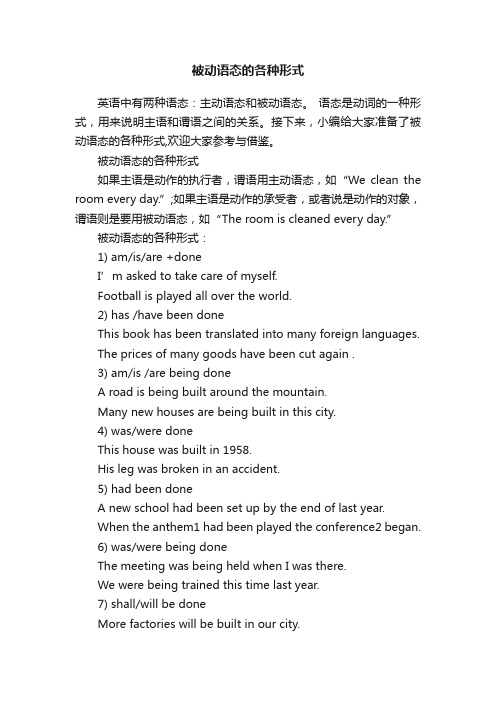
被动语态的各种形式英语中有两种语态:主动语态和被动语态。
语态是动词的一种形式,用来说明主语和谓语之间的关系。
接下来,小编给大家准备了被动语态的各种形式,欢迎大家参考与借鉴。
被动语态的各种形式如果主语是动作的执行者,谓语用主动语态,如“We clean the room every day.”;如果主语是动作的承受者,或者说是动作的对象,谓语则是要用被动语态,如“The room is cleaned every day.”被动语态的各种形式:1) am/is/are +doneI’m asked to take care of myself.Football is played all over the world.2) has /have been doneThis book has been translated into many foreign languages.The prices of many goods have been cut again .3) am/is /are being doneA road is being built around the mountain.Many new houses are being built in this city.4) was/were doneThis house was built in 1958.His leg was broken in an accident.5) had been doneA new school had been set up by the end of last year.When the anthem1 had been played the conference2 began.6) was/were being doneThe meeting was being held when I was there.We were being trained this time last year.7) shall/will be doneMore factories will be built in our city.He will be taken to hospital tomorrow.8) shall/will have been doneThe project will have been completed before July.Your clothes shall have been made for you soon.9) should/would be doneHe told me that his new cloths would be made by his mother.10) should/would have been doneHe told me that his new clothes would have been made very soon.扩展:常见的被动结构1、SVO句型的被动结构SVO句型中的谓语为单宾及物动词,其被动结构是:S + V(被动式) (+ by短语)。
七种被动语态形式
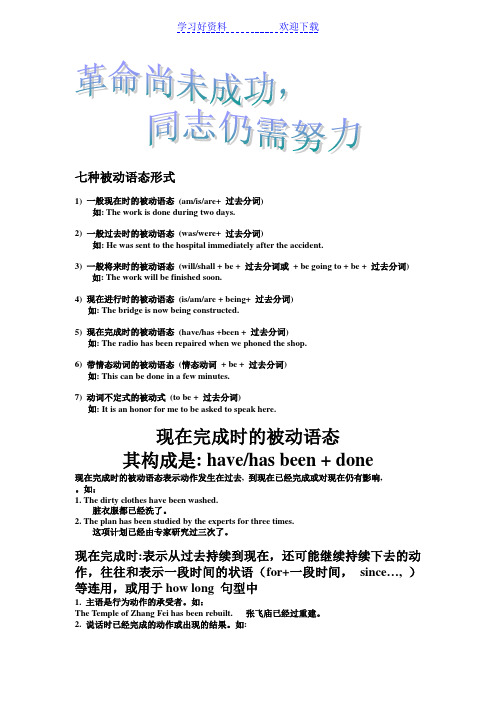
注意:
1.副词的位置
often, usually, always, never, hardly,seldom等副词置于have/has和been中间。
如:I have never been to Beijing.
.2.并不是所有动词都有被动语态
1) happen, take place, break out, belong to, cost, last等不及物动词或词组无被动语态。如:[误] Great changes have been takenplace in China since 1978.
3)一般将来时的被动语态(will/shall + be +过去分词或+ be going to + be +过去分词)
如: The work will be finished soon.
4)现在进行时的被动语态(is/am/are + being+过去分词)
如: The bridge is now being constructed.
他们已经被派往国外学英语了吗?
现在完成时被动语态特殊疑问句:疑问词+have (has)+主语+been+ done
1.What has been bought by Tom.汤姆已经买了什么东西?
2.Where has the car been repaired?这辆小汽车已经在哪里修理好了?
The Present ProgressivPassive Voice
脏衣服都已经洗了。
2. The plan has been studied by the experts for three times.
被动语态 被动语态的构成和用法

被动语态被动语态的构成和用法被动语态是英语中常用的一种语态,它用来表达动作的接受者,而不是执行者。
被动语态的构成和用法在英语语法中占据重要的位置。
本文将详细介绍被动语态的构成和用法,帮助读者更好地理解和运用被动语态。
一、被动语态的构成:被动语态的构成由be动词和过去分词构成。
be动词根据主语的不同形式而变化,过去分词则保持不变。
具体构成如下:1. 一般现在时的被动语态由am/is/are + 过去分词构成:- 主动语态:主语 + am/is/are + 动词原形 + 宾语- 被动语态:主语 + am/is/are + 过去分词 + by + 动作执行者(可省略)2. 一般过去时的被动语态由was/were + 过去分词构成:- 主动语态:主语 + was/were + 动词原形 + 宾语- 被动语态:主语 + was/were + 过去分词 + by + 动作执行者(可省略)3. 一般将来时的被动语态由will be + 过去分词构成:- 主动语态:主语 + will be + 动词原形 + 宾语- 被动语态:主语 + will be + 过去分词 + by + 动作执行者(可省略)4. 现在进行时的被动语态由am/is/are being + 过去分词构成:- 主动语态:主语 + am/is/are + 动词ing形式 + 宾语- 被动语态:主语 + am/is/are being + 过去分词 + by + 动作执行者(可省略)5. 过去进行时的被动语态由was/were being + 过去分词构成:- 主动语态:主语 + was/were + 动词ing形式 + 宾语- 被动语态:主语 + was/were being + 过去分词 + by + 动作执行者(可省略)二、被动语态的用法:被动语态在英语中具有以下几个常见的用法:1. 强调动作的接受者:被动语态可以使得动作的接受者成为句子的主语,突出强调动作的接受者。
被动语态的八大时态

目迈进行时
am/is/are +doing
过去进行时
was/were +doing
过去将来时 would +do
1. 一般目前时: People grow rice in the south of the country. Rice is grown in the south of the country. The school doesn't allow us to enter the
students soon.
A. is about to be discuss
B. is going to be discussed
C. is to discuss
D. is going to have been discussed
(一)语态转换时要注意旳问题
1. 把主动语态变为被动语态时,其谓语动词旳时态要与原句时态保 持一致,其谓语动词旳数要与新主语保持一致。
Practice
(1) The police found that the house ____and a lot of things ____D_____. A. has broken into; has been stolen B. had broken into ; had been stolen C. has been broken into; stolen D. had been broken into; stolen
A novel is to be read by him. They are going to hold a meeting tomorrow. A meeting is going to be held tomorrow. They are about to shoot the murderer. The murderer is about to be shot by them.
被动语态的用法_如何正确使用
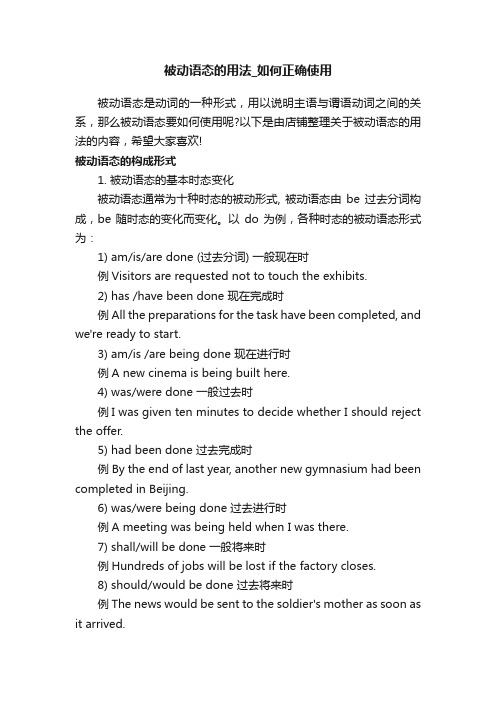
被动语态的用法_如何正确使用被动语态是动词的一种形式,用以说明主语与谓语动词之间的关系,那么被动语态要如何使用呢?以下是由店铺整理关于被动语态的用法的内容,希望大家喜欢!被动语态的构成形式1. 被动语态的基本时态变化被动语态通常为十种时态的被动形式, 被动语态由be 过去分词构成,be随时态的变化而变化。
以do为例,各种时态的被动语态形式为:1) am/is/are done (过去分词) 一般现在时例Visitors are requested not to touch the exhibits.2) has /have been done 现在完成时例All the preparations for the task have been completed, and we're ready to start.3) am/is /are being done 现在进行时例A new cinema is being built here.4) was/were done 一般过去时例I was given ten minutes to decide whether I should reject the offer.5) had been done 过去完成时例 By the end of last year, another new gymnasium had been completed in Beijing.6) was/were being done 过去进行时例A meeting was being held when I was there.7) shall/will be done 一般将来时例Hundreds of jobs will be lost if the factory closes.8) should/would be done 过去将来时例The news would be sent to the soldier's mother as soon as it arrived.9) shall/will have been done 将来完成时(少用)例The project will have been completed before July.2. 被动语态的特殊结构形式1)带情态动词的被动结构。
英语被动语态形式
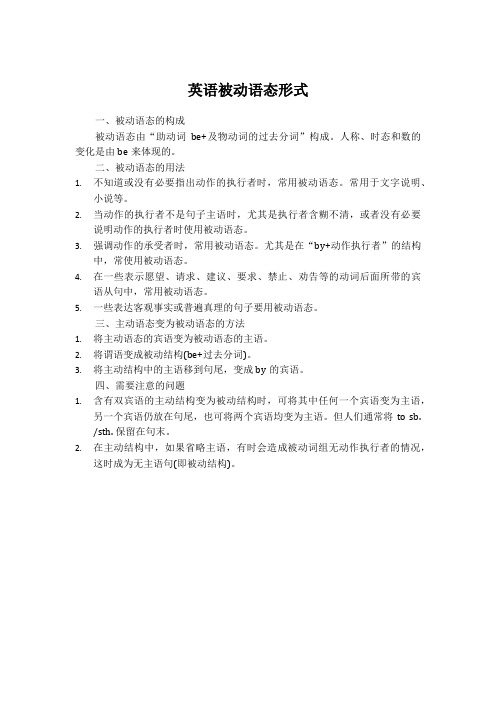
英语被动语态形式
一、被动语态的构成
被动语态由“助动词be+及物动词的过去分词”构成。
人称、时态和数的变化是由be来体现的。
二、被动语态的用法
1.不知道或没有必要指出动作的执行者时,常用被动语态。
常用于文字说明、
小说等。
2.当动作的执行者不是句子主语时,尤其是执行者含糊不清,或者没有必要
说明动作的执行者时使用被动语态。
3.强调动作的承受者时,常用被动语态。
尤其是在“by+动作执行者”的结构
中,常使用被动语态。
4.在一些表示愿望、请求、建议、要求、禁止、劝告等的动词后面所带的宾
语从句中,常用被动语态。
5.一些表达客观事实或普遍真理的句子要用被动语态。
三、主动语态变为被动语态的方法
1.将主动语态的宾语变为被动语态的主语。
2.将谓语变成被动结构(be+过去分词)。
3.将主动结构中的主语移到句尾,变成by的宾语。
四、需要注意的问题
1.含有双宾语的主动结构变为被动结构时,可将其中任何一个宾语变为主语,
另一个宾语仍放在句尾,也可将两个宾语均变为主语。
但人们通常将to sb.
/sth. 保留在句末。
2.在主动结构中,如果省略主语,有时会造成被动词组无动作执行者的情况,
这时成为无主语句(即被动结构)。
- 1、下载文档前请自行甄别文档内容的完整性,平台不提供额外的编辑、内容补充、找答案等附加服务。
- 2、"仅部分预览"的文档,不可在线预览部分如存在完整性等问题,可反馈申请退款(可完整预览的文档不适用该条件!)。
- 3、如文档侵犯您的权益,请联系客服反馈,我们会尽快为您处理(人工客服工作时间:9:00-18:30)。
被动语态一、构成英语有两种语态: 主动语态和被动语态。
主动语态表示主语是谓语动作的执行者, 被动语态表示主语是谓语动作的承受者, 其构成为be + 过去分词。
1 . 被动语态各种时态形式表一般时态进行时态完成时态现在am /is /are+ asked am /is /are +being asked has /have been asked过去was /were+asked was /were +being asked had been asked将来shall /will +be asked shall /will +have been asked过去将来should /would +be asked should /would +have been askedI’m afraid I am being followed . We had to take a detour . The road was being repaired .The case has recently been tried . All the tickets had been sold out when they arrived .English is taught in most schools in China . They were given a warm send-off .Their wedding will be held in the church . They were told that the result would be announced2 . 情态动词的被动语态含有情态动词的谓语变为被动语态时, 结构为:一般式: 情态动词( can, could, may, might , must , should, need 等) + be + 过去分词完成式: 情态动词( can, could, may, might , must , should, need 等) + have + 过去分词This can be done by hand . This mustn’t be neglected .二、被动语态使用要点1 . 不及物动词不能用于被动语态appear , rise, die, happen, occur, lie, depart , belong to, break out , take place 等都属此类动词。
例如: Great changes have been taken place in my hometown . (误)Great changes have taken place in my hometown . (正)2 . 表示状态的动词不能用于被动语态英语中有些动词(短语动词)不是表示动作, 而是表示某种状态或情况, 有“拥有、容纳、适合、缺少、明白”等意, 这类动词不能用于被动语态, 常见的有: lack , fit , mean, hold , resemble, have, cost , equal , contain, suit , comprise, become, last , possess, benefit , lack, befall 降临, fail, consist of, look like 等。
例如:The book costs 10 yuan . Jane resembles her mother . Note: 当have 作“吃, 接收, 经历, 度过”解时, 虽用作行为动词, 但一般不用于被动语态。
例如: The children had a most enjoyable holiday ... 但当have 作“得到, 获得, 欺骗”解, 或同某些介词、副词结合构成及物性短语动词时, 可用于被动语态。
例如: She has been had in the dealing( over the bargain) .The ticket can be had for the asking .The young man was had up by the boss . ( = was summoned) 3 . 某些动词的进行时也可表示被动意义,常见的这类词有: bake, owe, brew, cook, print, bind, do 等。
例如: The meat is cooking .The book is printing . The guns are firing .Apples are selling cheaply . ( = are being sold) The cow was milking . ( = was being milked) Drums and gongs are beating .( are being beaten) Some clothes are airing on the fence .4 . 不及物动词构成的短语动词能否用于被动语态1)及物动词构成的短语动词总是及物性的, 故可以用于被动语态(注意不可省掉或漏掉介词或副词) , 如win over, give up, ask for , make mention of 等。
但是, 不及物动词构成的短语可以是及物性的, 也可以是不及物性的; 不及物性的短语动词不可用于被动语态, 如look up/ down, speak for 等Things are looking up .(正)2)不及物动词构成的及物性短语动词则可以用于被动语态The man has always been looked upon with disapproval by his wife .The ground has been sat on and the bed has been slept in .Note: pay attention to, take care of 等短语动词可以有两种被动语态形式。
例如:The situation has been paid attention to . Attentions have been paid to the situation .The wounded are taken good care o f . Good care is taken of the wounded .3) rain 等不及物动词, 有时也转用作及物动词The meeting was rained out (off ) . A wheat crop has been rained out .Note: 下列短语动词不用于被动语态, 或在某层意思上不用于被动语态:①动词+ 介词→aim for , agree with, admit of (有.. 的余地) , adjust to, come to( 涉及) , become of(结果是) , belong to, accord with, abound in②动词+ 副词→get back, face out(坚持到底) , answer back(顶嘴) , have on(穿上)③动词+ 名词+ 介词→set sail for, give way to(让位于) , have a hand in (插手) , giveplace to④动词+ 副词+ 介词→keep up withHe answered his father back . (正) The committee consists of ten members . (正)No conclusion has been come to yet . 还没有得出任何结论。
( come to 表示“达成,得出”可用于被动语态)When it comes to politics I know nothing . 关于政治我一窍不通。
( come to 表示“关于, 涉及”不用于被动语态)5 . 主动形式表示被动意义的词1)某些感官动词和系动词加形容词可以表示被动意义, 如: look , smell, taste, feel , prove, wear, sound 等The flower smells sweet . The dish tastes delicious .2)某些及物动词后加副词( 有些可不加副词) 也可以表示被动意义, 如: wash, write, sell , read, open , cut , lock, peel , pack, play , shut , spot , split , strike, record, act , clean, draw, iron , keep, photo-graph 等This type of recorder sells well . That kind of shirt washes very well . Ripe apples peel easily .比较: The box doesn’t lock . (箱子本身的性质) The box was not locked . (箱子当时的状态)The door opened . (强调门自身开了) The door was opened .(强调被人打开了)The theory proved to be correct . (含有自身“证明”的特征)The theory was proved to be correct . (被人证明)3)want , deserve, need, require, repay, stand, take, won..t bear 和worth 等词的后面可以用动名词的主动形式表示被动意义这时, 动名词同句中的主语有动宾关系, 若动名词是不及物的, 后面还应有适当的介词。
例如:The book is worth reading . The coat requires mending . The rule will take some learning .6 . 被动语态中的几个常用介词用法比较by( agents)表示动作的执行者或施动力; with( tools)表示用某种工具; of (materials )表示由某种原料制成(制成品可见原料) ; from( substance)表示源于某种物质(制成品不可见原料)。
例如: covered by a lid 被盖子盖住covered with a lid 为盖子所盖着The article was written by Jack . (施动者) The pencil was sharpened with a knife . (工具)The room was lighted by electricity . 房间由电照明。
